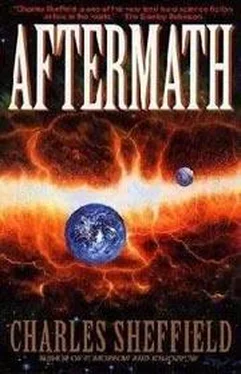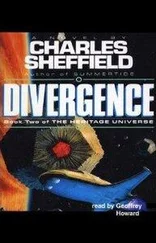The terrain below was gradually appearing as faint contrasts between dark gray and total black. Since their trajectory had not changed, they should be descending toward the suborbital field fifty miles west of Washington. If he could direct them in to that, they had at least a chance.
He glanced at the backup altimeter. That ought to be working; it used air pressure rather than computed absolute position. But it was too dark to see. His guess was that they had descended to around five thousand meters. They had maybe four minutes more flying time.
Below he saw rugged terrain, ranges of wooded hills.
The Shenandoahs? If so, they were getting close. He could hear the sound of rushing air on the streamlined body. That was unusual; during a normal powered descent it was masked by the noise of the engines. Should he say something to the passengers? If so, what? And how could he do it, with no cabin address system?
They were descending fast. Tom saw a broad river valley, and for a moment he had hopes. Then the hills were back, rushing closer beneath them. Their slopes seemed covered with soft, gray feathers. It was easy to imagine that you could land on that downy surface, and it would serve to brake your movement. Tom knew better. At four hundred miles an hour, those soft, pliable branches would chop the ship into small pieces.
He gripped the control stick more tightly. Janet Kloos reached over and placed her hand on his. “We’re not going to make it, are we?” she said quietly.
“I don’t think so.” Tom tried to match her calm. “Not unless something opens up in the next few seconds. It’s all trees down there.”
The banality, the normalcy, of their comments struck him. Last words ought to be epic and memorable, even if there was no way to record them. Were the flight recorders working? Probably not, since everything else had failed.
Her hand was still on his. The sound of air on the ship’s body had risen to a scream. The topmost branches of the forest streaked by a few meters below. In the final moment before the world ended, Tom had enough self-control and curiosity to think a final question: What killed us?
Third Strike. March 17, 2026; Bathurst Island, Canadian Arctic.
The oil rig could be worked by hand, but the cold was extreme and after the first day no one suggested it.
Early on the morning of the third day, Cliff Bar-ringer called a meeting of the four-man crew.
“We’ve all been talking for the past couple of days in bits and pieces. I want to get organized and make some decisions. Nothing’s working right, but I have no idea why. The good news is that we’re in no danger, and we won’t starve.”
“Or freeze,” Judd Clemens said. He was the oldest of the group, with thirty years of Arctic experience behind him. “Dahlquist says we’re sitting on the world’s biggest oil and gas field.”
“We are.” Dahlquist was the odd man out, a lightly built and nervous geologist half a head shorter than the others. “All the groups who have leases in the basin agree. The seismic data and chemistry indicate more light crude in the Sverdrup Basin than the Saudis ever had. But we shouldn’t be burning it — good quality hydrocarbons are too precious for that.”
“So we take a little drop, give us some light and keep our asses from freezing to the ground.” Barringer jerked his thumb toward the homemade lamps and the two oil stoves. “You want to turn those off, you do it over my dead body. Look, I don’t want to talk morality. I want to review the situation and make some decisions. The communications equipment is down, we’ve not heard a word from outside, and the rest of the group are two days overdue. What do we know, and what do we do?”
“We’re still getting paid, aren’t we?” Big Eddie Hansen was frowning. “I mean, we’re here. It’s not our fault if the equipment’s no good and the others don’t come.”
“Suppose they don’t arrive until midsummer?” Cliff Barringer addressed his question to all of them, not just Big Eddie. “How long are we willing to sit on our duffs and wait? You may be more patient than me, but I want to know what’s going on. When I turned in at nine o’clock three nights ago, everything was working—”
“Later than that,” Clemens interrupted. “Me and Eddie was outside watching the aurora. We come in at about half-ten when it clouded over, and everything seemed all right then.”
“So it happened sometime during the night. But when we got up, half our stuff was useless. I want to know why.”
“A lot more than half, I think. Radio and television communications. Computers.” Dahlquist began to tick items off on his fingers. “Snowmobile. Rig pump controller. Hut thermostat. Fuel cells. Clocks and watches. Fluorescent lights. Electric oven. CD player—”
“Enough,” Barringer interrupted. “What is working?”
“Everything mechanical. Oil stoves, and oil lamps, and the thermometer and can opener and hand pumps and the manual rig. Batteries still work. Everything simple. Nothing that uses electronics or elaborate controls.”
“Electronics? The snowmobile has a simple two-stroke engine—”
“—with an electronic fuel injection system.” It was Dahlquist’s turn to interrupt.
“All right. Look, you said all this yesterday. The question is, what can we do about it?”
“About the equipment? Nothing. We have no way of repairing electronic equipment. It’ll have to be heli-lifted south.”
“Which assumes that the helicopter arrives, when all we know is that it’s way overdue. If we knew what was causing this—”
“You know my suggestion. All this forms some strange sort of side effect of the supernova.”
“That happened down in the Southern Hemisphere,” Clemens said, in the tones of a man with little interest in any event south of the Arctic Circle.
“It did.” Dahlquist became defensive, as though this was now regarded as his supernova. “The star that blew up is at sixty degrees south.”
“About as far away from us as you can get.” Clemens proved that he knew a little more about southern events than he pretended. “It’s produced weird weather around most of the world, but nothing here. And it started over a month ago, and it’s nowhere near as bright now as it was. So how could it cause trouble now ?”
“I don’t know.”
“Look, you two.” Barringer wondered why he could never hold a decent meeting. The talk always seemed to run off down side alleys. “I’d like to know what caused the trouble, too. But I’d like a hell of a lot more to decide what we’re going to do right here in this camp. And I don’t want a debate. I want to make some suggestions.”
That produced at least a temporary silence. Barringer waved his arm around, indicating the walls of the prefabricated hut. “You could probably run right through the walls if you wanted to, but it won’t blow away and it’s thermally insulated. So option one is to sit in here and wait ’til we all go crazy with each other’s company. I don’t like that. So here’s my idea. We know that BSP has leases northwest of here, and Amarillo has leases to the southwest. They must have test crews, too.”
“They do,” Dahlquist said. “I talked to them a week ago, about interpretation of the seismic.”
“Do you know where their camps are?”
“Pretty well. They’re both fifteen to twenty miles away from us. I can give you a heading.”
He did not say “compass heading.” Bathurst Island sat almost on the North Magnetic Pole.
“We can manage twenty miles,” Barringer said, “even without the snowmobile. It’s time we compared notes with the other groups. If we’re the only ones with troubles, great. They’ll help us. If we’re all in the same boat, then we’ll help each other. So I say we draw lots, to decide who—”
Читать дальше












